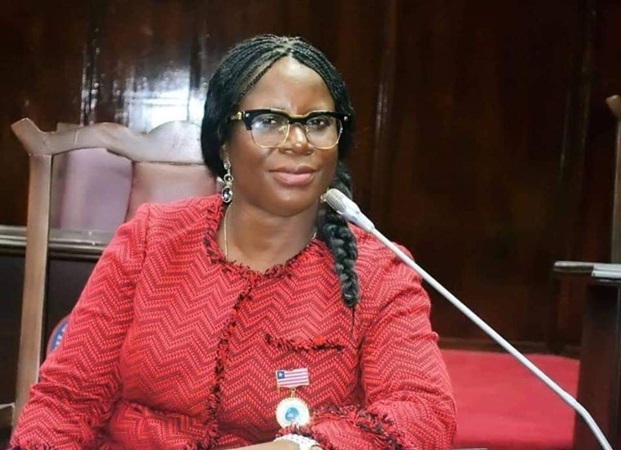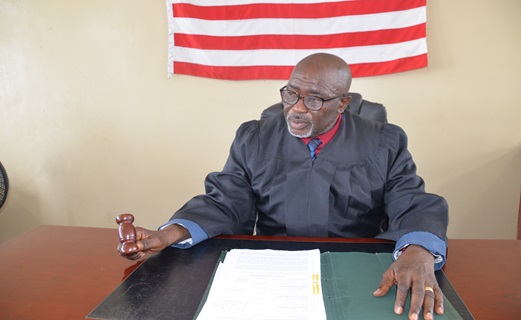By Momoh B. Siryon
A Liberian, an Administrator, and a Communicator
Pro Tempore is a Latin word which in English, is translated as: “for the time being,” meaning that the President Pro Tempore is the Temporary President of the Liberian Senate. The debate as to who becomes the next Senate Pro Tempore of the Liberian Senate has begun with many persons suggesting names of lawmakers who they believe can better run the affairs of that august body.
The 1986 Constitution Article 47 states: “The Senate shall elect every six years a President Pro Tempore who shall preside in the absence of the President of the Senate, and such other officer as shall ensure the proper functioning of the Senate”
Many have mixed views about who really takes on the position in the Liberian Senate as they do not want anyone who they believed will be remote-controlled by the ruling establishment.
The office of the President Pro Tempore role is to assume the responsibilities of the President of the Senate, (who is also the Vice President of the Republic of Liberia), when absent.
As the Pro Tempore of the Liberian Senate, who is also a Senator of a County; is just considered “First Amongst Equal” and oversee rules, procedures and further presides over regular sessions during plenary discussions.
From this background, the most preferable Senator poised for such position is Grand Bassa County Senator, Nyonblee Karnga-Lawrence, who is currently serving as a Senator of Grand Bassa County for the second time.
Based on her experienced and leadership ability, Senator Karnga-Lawrence is well-suited to lead the Senate as the Pro Tempore. As a gladiator and administrative supervisor of the Liberian Senate; Senator Karnga-Lawrence can serve in the space on grounds that she will know how to balance the discussions as a mother and a leader; when she serves in such position, she will be able to push the country’s agenda and the agenda of women in Liberia.
It is also believed by legislative pundits, that the ascendency of Senator Karnga-Lawrence will also give advice and consent to some executive decisions (to include appointed officials confirmations).
Senator Karnga-Lawrence is currently serving her second term as the Bassa Senator and Chairs the Rules, Order, and Administration Committee at the Liberian Senate. If elected, she will be the second female in the history of the Liberian Senate. The first woman to head the Liberian Senate as Pro Tempore was former Montserrado County Senator, Grace B. Minor.
A renowned women’s rights campaigner and social justice activist, as well as Head as of the Women’s Legislative Caucus, Senator Karnga-Lawrence was first elected to the Senate in 2013 in a by-election to replace the late Grand Bassa County Senator, John Francis Whitfield. She was re-elected during the 2020 mid-term elections.
Throughout her first term, she stood as a campaigner and the only female in a Senate comprising 29 men.
As Senator, Karnga-Lawrence has dedicated her time, energy, and resources to amplify the voices of Liberians, particularly those at the lowest socio-economic levels. She continues to confront forces that threaten the economic and social well-being of the Liberian people.
I was opportune to have interacted with Senator Lawrence on countless occasions through her late husband, Representative Adolph Akwe Lawrence (who was a big brother and mentor for me); during those interactions, I observed that the Grand Bassa County Senator is a good leader with integrity, self-awareness, courage, respect, empathy, and gratitude. I believe when given the opportunity as Pro Tempore, her leadership will see these key leadership qualities that will improve the senate at all levels.
A good leader should be learning alert and flex their influence while communicating and delegating effectively to get the work done. The senate needs a good leader to help guide the senate and make the essential large-scale decisions that keep the country moving.
The Constitution vests the legislative power of Liberia in both the Senate and the House of Representatives; which must both concur on Bills before to it being sent to the President. In addition, the Senate possesses several exclusive powers under the Constitution, including the power to advise and consent to the President’s appointments to both the executive and judicial branches; and the duty to try all public officials impeached by the House of Representatives.
Unlike the Vice President, the President Pro Tempore cannot cast vote to break a tie on votes when the Senate is evenly divided. The President Pro Tempore has enjoyed many privileges and some limited powers. During the Vice President’s absence, the President Pro Tempore is empowered to preside over Senate sessions.
During the Vice President’s absence, the President Pro Tempore is empowered to preside over Senate’s sessions. Except when necessary or to highlight important votes, the Vice President and the President Pro Tempore Rarely Preside; instead, the duty of Presiding Officer is rotated to give senators experience in parliamentary procedure.







